- Home
- Margaret Brownley
Do You Hear What I Hear? Page 3
Do You Hear What I Hear? Read online
Page 3
“Thank you,” Sally said, reaching for a spoon.
“Is that all you’re eating?” Rick asked when they were alone again.
All? It was at least twice as much as she usually ate for breakfast. She glanced at his plate, piled high with bacon, eggs, bacon, hash browns, and more bacon.
As if their plates were a reminder of the differences that had drawn them apart, their gazes clashed and held for a moment before they both looked away.
Fortunately, there was a lot to look at. The dining room was decked out in enough Christmas splendor to make a great magazine cover. Garlands of greenery hung from the crystal chandelier. Holly and poinsettias decorated the dining room table. Even the pictures on the walls and the large mirror over the buffet were draped with silver strands of tinsel.
From the parlor came the sound of Toby’s voice. The heavenly host was alive and well.
Fork in hand, Rick watched her fill her cup, eyebrows raised. “Since when did you start drinking coffee?”
“Since it was declared healthy for you.”
He stabbed his fork into his hash browns. “One day they’ll declare bacon healthy. Mark my words.”
“I hope for your sake they do,” she said. Come to think of it, they never could agree on what to eat. Or where to dine. Their relationship might have had a better chance of working had they avoided meals.
For the next few minutes only Toby’s voice broke the silence. Then suddenly Rick chuckled.
“What’s so funny?” she asked.
“Toby’s heavenly host reminds me of something. Remember the time you got your ponytail caught in your wings?”
“You should talk.” She stabbed a piece of melon with her fork. “You were so embarrassed at being an angel, you told everyone you were a mangel.”
His eyes lit with humor. “I thought that was the word for male angel. I didn’t know mangel was a sugar beet.” He shook his fork. “At least I didn’t get into a fight on stage.”
She groaned inwardly. He would have to bring that up. It happened the year she played Mary and Jerry what’s-his-name played Joseph. “That’s because Jerry insisted baby Jesus was a girl,” she said defensively.
“A likely story.” He took a sip of coffee. “Remember the time Billy Reynolds dropped his candle and set fire to the stage curtains?”
The memories kept coming and so did the laughter. It was like old times again, before their differences got in the way. Remembering how it all ended, she felt an old familiar ache. It seemed like they couldn’t agree on anything. She hated the blow-’em-up movies he picked. He had no patience for the kiss-and-sob films she favored. She liked soft rock, and his music of choice was country. But the main source of conflict was his family business. When she looked at a tree, she saw no less than a miracle. In contrast, Rick judged a tree by how many board feet it produced.
Angel breezed into the dining room with another pot of coffee. “You two sound like you’re having a good time.”
Sally met Rick’s gaze and felt her cheeks grow warm. “We were just talking about some of the Christmas pageants in the past.”
Angel looked interested. “I take it you two have known each other for a while.”
“We met in first grade,” Sally said, “but we didn’t become—” she searched for the right word— “friends until high school.”
“You mean you were high school sweethearts?” Angel’s gaze Ping-Ponged between them, seemingly unaware of the sudden tension in the air.
Sally swallowed hard. Angel sure didn’t mince words. She glanced at Rick who looked as uncomfortable as she was. “Yes,” she said, keeping her voice light. “Just like the mismatched couple in the movie Pretty in Pink.”
Angel refilled Sally’s cup. “Now, isn’t that nice.”
Sally stared into her empty bowl. She’d tried for nearly ten years to forget Rick, but now knew how much she’d failed. How do you forget someone who shares so much of your history?
Toby’s shrill voice floated into the dining room, interrupting Sally’s thoughts. “AND THERE WERE SHEPHERDS LIVING OUT IN THE FIELDS . . .”
Rick took the opportunity to make his escape. “No more coffee for me,” he said before standing and turning to Sally. “I called the highway patrol and the road is clear. I’ll be happy to drive you to your car. I’ve got jump cables. It could just be the battery.”
She hesitated. Alone with Rick in a car? Her stomach tightened. Not good. “Thank you, Rick,” she said after a beat, but only because she couldn’t think of a graceful way to turn down his offer. “That would be a big help.”
He grabbed his coat from the back of his chair. “I’ll go warm up the car. Meet me outside when you’re ready.”
He left the room and Angel called after him, “Don’t let the cat out.” She turned her attention back to Sally. “More coffee, Miss Cartwright?”
“No, I’ve had enough, thank you. And please call me Sally.”
“Sally, huh? Like that heroine in the movie”—Angel snapped her fingers as if the title were on the tip of her tongue—“Sally and Harry something.”
“When Harry Met Sally,” Sally said. Angel hardly knew her but already she’d picked up on her movie obsession.
“Is that who you were named after?” Angel asked.
The idea of her no-nonsense mother naming her after a fictitious character in a romantic comedy made Sally laugh. “I was named after an aunt.”
“Aunt or not, you remind me of the Meg Ryan character with your blond hair and all.” Angel reached for Sally’s empty bowls. “Hope Toby wasn’t a bother.”
“Not at all,” Sally said. “It’s nice seeing someone so young take his responsibilities seriously.”
“That he does,” Angel said, with a note of pride. “His teacher told him he had to speak up loud and clear because they’re videotaping. His dad’s in Colorado and Mrs. Greenwell promised to send him a CD. Toby is determined his father hear every word.”
Sally felt a pang. She remembered the day her father walked out of her life. It was the year she played the part of an angel. Dressed in her white gown and angel wings, she stood on her toes looking out at the audience and hoping against hope her father had come to see her.
“Why is Toby’s father in Colorado?” Sally asked.
“Lost his job at the mill beginning of the year and hasn’t been able to find another one. He’s hoping to find work, but the lumber mills in Colorado seem to be having the same problems they have here.” She shrugged. “So far no luck.”
Reminded that she was also jobless at the moment, Sally laid her napkin on the table and stood. At least she didn’t have a family to support. “I’d better go. Rick is waiting.”
She thanked Angel and paid for the night’s lodging. With a wave at Toby—still hanging over the second-floor railing airing his lungs—she tugged on her knitted hat and dashed out the front door. Her ears were still ringing when she met Rick at the bottom of the drive.
Chapter 6
“I see you’re still driving Mr. Peepers,” Sally said as she slid into the passenger side of Rick’s old Jeep Wrangler. Sally had named it Mr. Peepers because the headlights looked like the glassy eyes of someone who had partied too hard the night before. Still did.
Rick preferred old cars; she liked them shiny and new. Another glaring difference between them.
Rick gave the peeling dashboard a loving pat. “You don’t think I’d give up my ol’ buddy, do you? We’ve gone through a lot of mileage together.”
“Yeah, well, somehow it looks better on you. Sounds better, too.”
“Shh,” he said, pulling away from the curb. “You’ll hurt Mr. Peepers’s feelings.”
“Oops.” She covered her mouth and giggled. Sitting on the now cracked leather passenger seat was like old times. Too much so.
During their high school years he’d pick her up like clockwork every Saturday night. They’d either go to the movies or hang out with friends at the local pizza parlor. They were the perfect couple; the env
y of all their classmates. At first their differences hadn’t seemed to matter. He helped her with algebra; she helped him with English. He practiced his Spanish on her and she practiced her French.
It wasn’t until the very last year of high school that their differences came to matter a lot.
Pushing the thought away, she adjusted the heater vent. “Angel said that Toby’s father lost his job at the mill.”
She heard his intake of breath and sensed his hesitation. “My father had no choice but to let some of his employees go. I’m afraid things will get a whole lot worse if I have to shut down the mill altogether. At least seventy families will be affected.”
Sally stared at him with rounded eyes. The mill had been built and operated by Rick’s grandparents during the great building boom following World War II.
“You aren’t seriously thinking of shutting it down, are you?”
Rick’s gaze remained focused on the road. “The recession hit hard, and new construction still lags behind.”
“But the economy is improving,” Sally said. No one could prove it by her or the magazine she no longer worked for, but that’s what the politicians kept saying.
“Yeah, well, even if it keeps improving, it’s not going to help all that much. We’re almost out of timber. I’ve had to truck in lumber from Idaho, and that’s costly.”
“I don’t understand, Rick. How can you be out of timber?”
He glanced at the rearview mirror. If the expression on his face was any indication, he was looking back at more than just the road. Guessing at his thoughts, she clenched her hands in her lap.
Years ago, she’d convinced the county to issue an ordinance preserving the woods in and around Heywood. Only seventeen at the time, she chose to earn her Girl Scout Gold Award by helping to save the endangered white spotted owl. For one so young to accomplish what other conservatists had failed to do, got media attention. She was declared both a hero and an enemy, depending on whether a person favored nature or local industry. Things got pretty nasty.
She received her hard-earned award, but the effort underscored what she already knew: She and Rick were on two different paths heading in opposite directions.
Rick’s family couldn’t forget or forgive that she had single-handedly put the family business on the road to financial ruin. Rather than make Rick choose between her and his family, and knowing that things could never again be the same between them, she left Oregon to attend the UCLA School of the Arts. She’d cried for a week solid after she and Rick had said good-bye, but there was no other way.
It took only a few minutes to reach the road that ran parallel with the town, but the tension of words unspoken made the distance seem longer. Dark clouds promised more snow on the way later that day.
“My car should be just around the curve,” she said, breaking the silence that had settled between them.
Only it wasn’t.
She sat forward in her seat with a puzzled frown, scanning the roadside. “I could have sworn . . .”
“Maybe it’s down the road a piece,” Rick said. “Things look different during the day.”
He drove slowly, careful to avoid the patches of black ice.
“I know it’s not this far,” she said after a moment or two. “I could see the star on top of the inn from my car.”
Braking, Rick swung a U-turn and slowly retraced the route.
Her gaze followed the side of the road. “Maybe someone stole it.” She was pretty sure she’d locked the car, but maybe in the all confusion she’d forgotten.
He pulled onto the shoulder and reached in his pocket for his cell phone. “Or maybe someone towed it back to town.”
A couple of phone calls later, one to the Heywood police department, he shoved the phone back into his pocket. “No one knows anything about your car,” he said.
Her spirits dropped like a lead balloon. Her Honda wasn’t even paid for.
He released the brake and shifted into drive. The Jeep inched forward. “Okay, you said you could see the star.”
She nodded. “I followed it through the woods.”
A mile or so later he pulled to the side of the road and turned off the engine. “Unless I miss my guess those woods are directly behind the inn.”
“If that’s true, then the car should be over there.” She craned her neck. “That’s funny. I distinctly remember a snowbank.”
“Let’s have a look.” He stepped out of the driver’s side and jogged across the road.
She climbed out of the car and trailed after him, careful not to slip on the icy patches. “I’m pretty sure this is the spot,” she said, pointing to the tire tracks in a drift of snow.
“This is the place all right,” he said, tossing a nod to the flash of red below. “Looks like the shoulder caved, taking your car with it.”
Hand on her mouth, she cried out. “Oh, no! No, no, no!” This can’t be happening. She half ran, half slid down the incline.
“Sally, wait!”
She reached her car out of breath. A Douglas fir had kept it from rolling all the way down the hill, but the whole front end of her Honda was bashed in. She fell to her knees in the snow.
Rick slid to her side. “Sally, are you okay?” Stooping, he reached out to her.
She held him off with the palms of her hands. “I’m fine. Just don’t say anything nice to me or I’ll lose it.”
“Okay, then. I hate your guts.”
“Thank you,” she said. “That’s a big help.” It was an old joke between them, and the fact that they’d recalled their lines so effortlessly was yet another reminder of what she and Rick had once had and lost. If the thought wasn’t depressing enough, the red Honda looked like a broken heart half buried in the snow. She blinked in despair and pushed the thought away, but nothing could be done about the desolate feeling that washed over her—a feeling she was all too familiar with.
Rick rose and studied the damage to her car. “I’ll call Bud’s garage and have him send a tow truck.”
“Bud can’t fix this.”
“Hey, that’s Bud the whiz kid we’re talking about. He can fix anything,” he said, the confidence in his voice contradicting his doubtful look.
She gazed at the car in despair. It seemed that everything she loved ended in a train wreck. “Can he fix me?” she asked.
Rick’s eyebrows shot up. “What are you talking about? There’s nothing wrong with you.”
“That’s what you think.” She rose to her feet and brushed the snow off her skirt. “Can he find me a job? Can he bring . . .” She almost asked if he could bring back lost fathers. The thought surprised her. Good grief, what was she thinking? At the age of twenty-eight, she’d gotten over her father’s desertion years ago. So what made her think about that now? She groaned inwardly. The little boy, Toby . . .
“What’s this about your job?” Rick asked.
She hadn’t wanted to tell anyone, and didn’t know why she’d told him. “I got fired.” His raised eyebrows made her repeat it. “Yes, you heard me, fired.”
He’d always had trouble expressing himself verbally, but today his sympathetic expression spoke volumes.
“Of course no one uttered the F-word,” she continued, allowing her anger to build. It was either that or start crying, and she didn’t dare break down in tears. Not in front of that big broad chest of his.
“Oh, no. They didn’t even give me the respect of calling a spade a spade. Instead, they made it sound like they were doing me a favor.” Why couldn’t they just say the magazine was in trouble so they had to let her go?
“My boss said they wanted to allow me to”—she wiggled her fingers into quote marks—“pursue other career opportunities.” She scoffed. “Do you have any idea how few career opportunities exist for an art director? Hardly anyone reads newspapers or magazines anymore.”
“I’m sorry, Sally. I didn’t know. As for the car, you’ll be amazed what Bud can do.”
She stared at the wreck. “Can he
heal my grandmother?”
“Only if she runs on gas.”
She glanced up at him and there it was: the same twinkle in his eyes she remembered from her youth. As odd as it seemed, she laughed. Come to think of it, Rick always did make her laugh.
“I’m sorry,” she said, feeling utterly foolish. “I didn’t mean to dump my problems on you.”
He quirked a smile. “Don’t worry about it. That’s what friends are for.” He took her by the arm. “Come on . . .” The warm, pleasant sensations emanating from his touch were more disconcerting than comforting. Only after they’d worked their way up to the road and he’d released her was she able to take an honest breath.
“I’ll drive you home to your grandmother’s house if you like. There’s nothing we can do here.”
In addition to making her laugh, he also knew how to make her cry and now that he’d mentioned the H-word, this was one of those times.
Chapter 7
Minutes later Rick pulled up to the curb in front of the Raising Cane Care Center. Concerned about her grandmother, Sally had asked him to drop her off there rather than the house. Now he watched as she unbuckled her seat belt and climbed out.
He leaned across the passenger seat. “Don’t worry about your car. I’ll stop by the garage and ask Bud to tow it.”
She tossed him her car keys and rested a bangled arm on the door frame. Her big expressive eyes peered at him from beneath a floppy blue knit hat. “Thank you, Rick. That would be a big help. Is there a local car rental place nearby?”
“’Fraid not. I’d lend you one of my vehicles but I don’t think you’d like driving around town in a logging truck.”
She laughed. A sweet musical sound that reminded him of the day he had first fallen in love with her. Though he’d known Sally since first grade, things had taken a dramatic turn in his sophomore year of high school. He and his friends planned to play hooky after first period, but that laugh of hers changed everything. Turning to look at her, he no longer saw the pesky kid he’d known since first grade. Seemingly overnight, Sally Cartwright had turned into the prettiest girl he’d ever laid eyes on. Even more amazing, she had laughed at one of his silly jokes. That was the day when all the romantic poems he had been forced to read in English class suddenly made sense. Just like that, skipping school held no appeal.

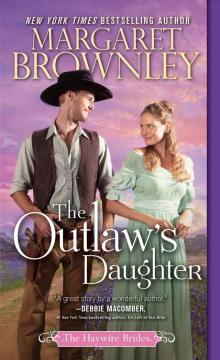 The Outlaw's Daughter
The Outlaw's Daughter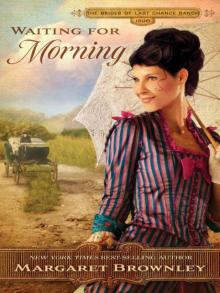 Waiting for Morning (The Brides Of Last Chance Ranch Series)
Waiting for Morning (The Brides Of Last Chance Ranch Series) Do You Hear What I Hear?
Do You Hear What I Hear?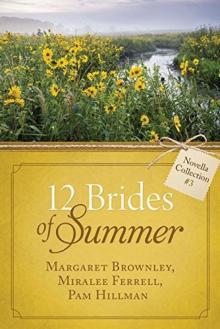 The 12 Brides of Summer Novella Collection #3
The 12 Brides of Summer Novella Collection #3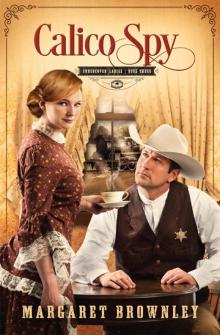 Calico Spy
Calico Spy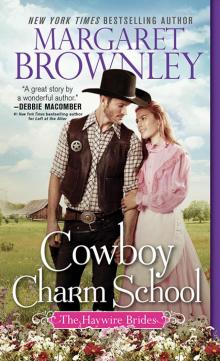 Cowboy Charm School
Cowboy Charm School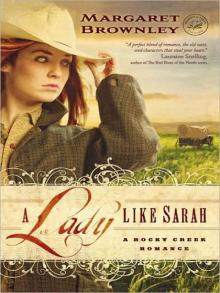 A Lady Like Sarah
A Lady Like Sarah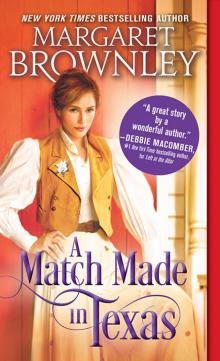 A Match Made in Texas
A Match Made in Texas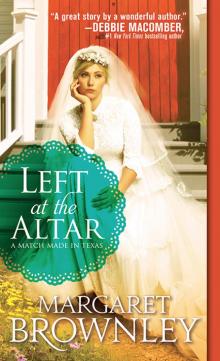 Left at the Altar
Left at the Altar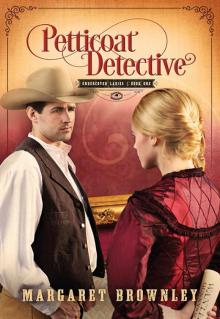 Petticoat Detective
Petticoat Detective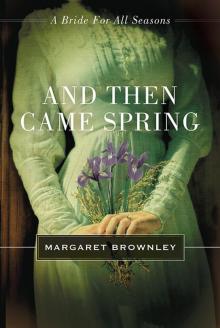 And Then Came Spring
And Then Came Spring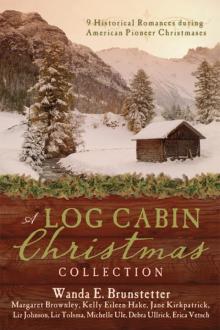 Log Cabin Christmas
Log Cabin Christmas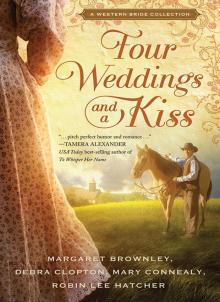 Four Weddings and a Kiss
Four Weddings and a Kiss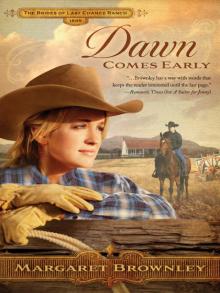 Dawn Comes Early
Dawn Comes Early